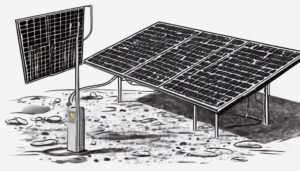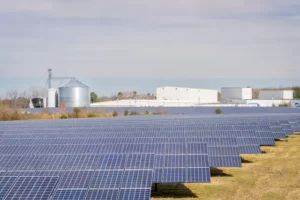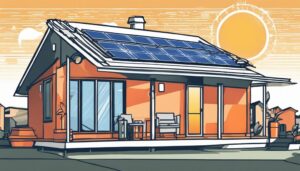In the age of solar power, keeping your panels pigeon-proof has become as crucial as sending a telegram was in the 19th century. You've likely invested a pretty penny in your solar setup, and the last thing you want is for pigeons to turn it into their new roost. The cost to safeguard your panels can vary significantly, depending on several factors including the size of your system and the specific deterrent methods you choose. As you weigh the initial financial investment against the potential damage pigeons can cause, consider the long-term savings and peace of mind that come with a well-protected solar array. Let's explore what it takes to keep these unwelcome guests at bay, and how you can do so without breaking the bank.
Key Takeaways
- Installation costs vary, with DIY options being more cost-effective but requiring skill and time.
- Investigating local incentives can significantly reduce initial financial investment.
- Maintenance involves regular cleaning and checks, with warranties playing a crucial role in cost management.
- Material quality impacts long-term effectiveness and overall expenses in pigeon-proofing solar panels.
Initial Financial Investment
Understanding the initial financial investment required for pigeon proofing solar panels is crucial for assessing the cost-effectiveness of this preventive measure. You'll find that the upfront costs can vary significantly, influenced heavily by location factors and the availability of government incentives. Location determines not just the environmental conditions to which your solar panels are exposed, but also the prevailing rates for labor and materials in your area. In regions where pigeon infestation is a common concern, local governments or energy agencies might offer incentives or rebates to offset a portion of your expenses, recognizing the importance of maintaining efficient solar energy production.
These government incentives can drastically reduce your out-of-pocket costs, making it a financially savvy move to investigate what's available in your area before proceeding. Furthermore, the specific characteristics of your installation site—such as the size of your solar array and the complexity of your roofing structure—will also influence the initial financial commitment necessary for pigeon proofing. By understanding these key factors, you're better equipped to make an informed decision about the feasibility and potential return on investment of undertaking such a preventive measure against pigeon-related damage to your solar panels.
Installation Fees Overview
Diving into the realm of installation fees, it's essential to recognize that these costs will vary widely based on several critical factors, including the complexity of your solar panel setup and the local rates for professional services. When you're exploring how to pigeon proof your solar panels, you'll find that regional price variations and the choice between professional vs DIY approaches significantly influence the overall cost.
| Factor | Professional Installation | DIY Installation |
|---|---|---|
| Complexity | High complexity increases cost | N/A due to variable skill levels |
| Materials | Often included in service fee | Must be purchased separately |
| Time | Completed quickly by experts | Time-consuming, depends on personal speed |
| Warranty | Usually includes service warranty | No warranty for workmanship |
| Regional Prices | Varies by location, can be higher in urban areas | Only material costs are affected |
Deciding between a professional or DIY installation hinges not just on the upfront costs but also on considerations like time investment, skill level, and the value of a professional warranty. While DIY might appear cheaper at first glance, the lack of a warranty and potential for higher material costs due to lack of professional discounts can narrow the price gap. Analyzing these factors carefully will help you make an informed decision that suits your needs and budget.
Ongoing Maintenance Costs
After the initial installation, you'll need to consider the ongoing maintenance costs essential for keeping your pigeon-proofing measures effective over time. These costs are influenced by factors such as cleaning frequency and warranty considerations, which play crucial roles in ensuring the longevity and effectiveness of your pigeon-proofing solution.
Cleaning frequency is paramount; it's not just about maintaining the aesthetic appeal of your solar panels but also about preserving their function. Accumulation of debris and nesting materials can negate the efforts of pigeon proofing, necessitating regular checks and cleaning. Depending on your location and the severity of pigeon activity, maintenance checks could be required semi-annually or even quarterly.
Warranty considerations are another aspect you can't afford to overlook. When selecting pigeon-proofing products, it's wise to opt for options that come with a comprehensive warranty. This warranty should cover not only the materials but also any potential damage to your solar panels caused during the installation process. A robust warranty can significantly reduce long-term maintenance costs by ensuring that any failures in the pigeon-proofing measures are addressed without additional expenses on your part.
In essence, a strategic approach to ongoing maintenance, factoring in cleaning frequency and warranty considerations, is vital for the sustained protection of your solar panels against pigeon-related damages.
Material Expenses Breakdown
Having explored the importance of ongoing maintenance, let's now examine the costs associated with the materials needed for pigeon-proofing solar panels. To ensure the longevity and efficiency of your solar panel system, addressing durability concerns and considering the weather impact are paramount.
The primary materials used in pigeon-proofing include mesh screening, spikes, and clips, all of which vary widely in quality and, consequently, in price. High-quality, durable materials are crucial, as they will be exposed to the elements year-round. Inferior products may offer short-term savings but can lead to increased maintenance costs and potential damage to your solar panels over time.
Mesh screening, designed to prevent pigeons from accessing the area beneath solar panels, should be UV-stabilized to withstand sun exposure without degrading. The cost of this material largely depends on the size of your solar panel array and the quality of the mesh.
Spikes and clips, used to secure the mesh in place, must be made from weather-resistant materials such as stainless steel or UV-protected polycarbonate. Their prices are influenced by the durability and design sophistication required to ensure they remain effective without causing damage to the solar panels.
Cost-Effective Prevention Strategies
To effectively minimize costs while pigeon-proofing your solar panels, it's essential to evaluate various prevention strategies for their cost-efficiency and impact on system performance. Among the spectrum of options, DIY solutions stand out for their potential to reduce expenses significantly. By leveraging simple, readily available materials, you can construct barriers or spikes that deter pigeons without necessitating professional installation services. However, it's crucial to balance cost-saving measures with system integrity, ensuring that homemade modifications do not impede solar panel efficiency or cause damage.
Moreover, legal considerations play a pivotal role in selecting a prevention strategy. It's imperative to familiarize yourself with local wildlife protection laws to avoid legal repercussions. Unauthorized methods or materials that harm pigeons could lead to fines or legal action, negating any initial savings. Therefore, conducting thorough research or consulting a legal expert before implementing DIY solutions can safeguard against potential legal issues.
Frequently Asked Questions
How Does Pigeon Proofing Solar Panels Impact Their Energy Efficiency and Performance?
Pigeon proofing your solar panels won't hinder their energy efficiency if done right. It ensures panel cleanliness, keeping bird behavior from affecting performance. Proper installation avoids shading and allows sunlight to reach the panels unobstructed.
Can Pigeon Proofing Materials Affect the Warranty of My Solar Panels?
Yes, pigeon proofing materials can affect your solar panels' warranty. It's crucial to check warranty specifics and follow installation guidelines closely to avoid voiding it. Ensuring compatibility and proper installation is key to maintaining warranty protection.
Are There Any Legal or Environmental Considerations to Keep in Mind When Pigeon Proofing Solar Panels?
When pigeon-proofing your solar panels, you'll need to consider bird legislation and habitat alteration. It's crucial to ensure your methods comply with local wildlife laws and don't harmfully impact bird populations or their habitats.
How Often Do Pigeon Proofing Solutions Need to Be Replaced or Updated?
You'll need to consider maintenance frequency and material durability when updating pigeon proofing solutions. Typically, higher quality materials last longer, reducing the need for frequent replacements. Always assess the environment's impact on your chosen solution's longevity.
What Are the Most Humane Methods for Pigeon Proofing Solar Panels, and How Do They Compare in Cost and Effectiveness?
You're exploring humane pigeon proofing methods for solar panels, focusing on installation ease and seasonal variability. These solutions vary in cost and effectiveness, with some requiring more frequent updates due to environmental factors.
Conclusion
In conclusion, pigeon-proofing your solar panels requires an initial financial outlay, covering installation fees, material expenses, and ongoing maintenance costs. Analyzing the breakdown of these costs reveals that while the upfront investment might seem significant, employing cost-effective prevention strategies can significantly mitigate future expenses. It's essential to weigh these factors carefully, understanding that the right approach not only protects your solar investment but also ensures its efficiency and longevity in an economically sensible manner.



